My fondest childhood memories involve the aroma of roast beef filling our home every Sunday. This quintessential comfort food transforms an ordinary dinner into a special occasion, requiring minimal effort but delivering maximum flavor. This foolproof technique yields a juicy, tender roast with a perfectly crisp crust that’s worthy of your most cherished family gatherings. Once you master this method, you’ll never want to prepare roast beef any other way.
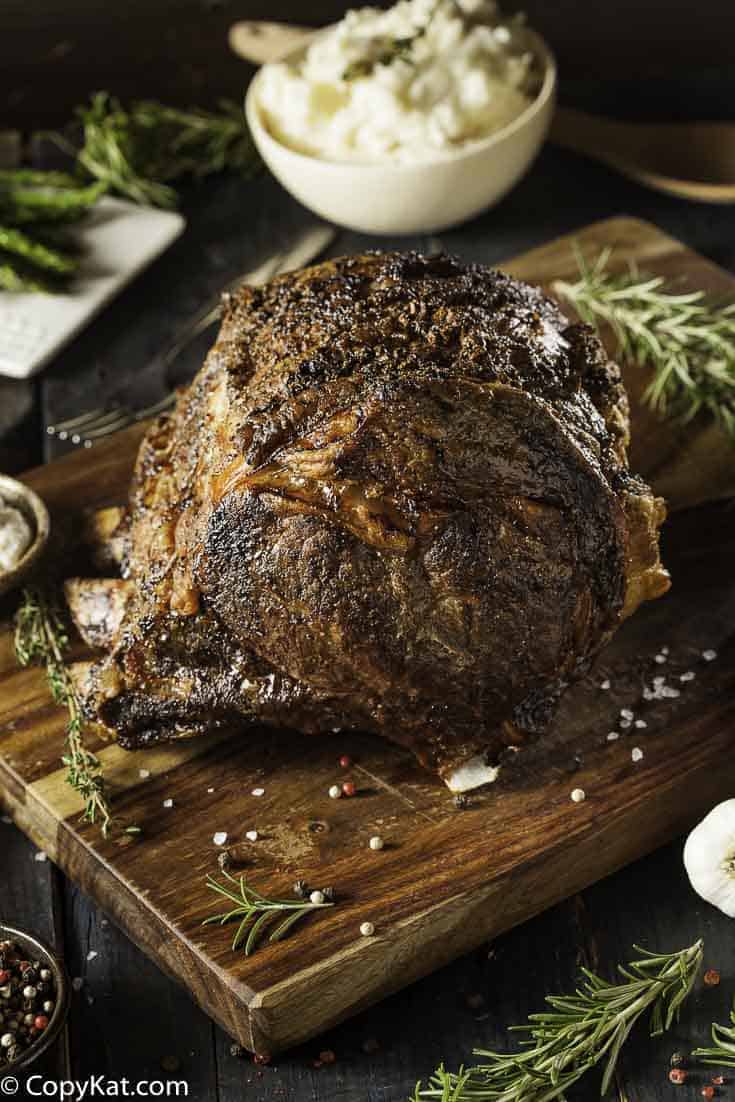
Why This Roast Beef Recipe Works
Growing up, Sunday meant roast beef. As an adult, I continue this tradition during cooler months, creating hearty meals that bring families together. While beef roasts are quite uncomplicated to make, there’s something special about slow-roasted roast beef that’s hard to resist. This method ensures even cooking, maximum juiciness, and that coveted crispy exterior that makes every bite memorable.
How to Choose the Best Beef
This recipe works well for most cuts of beef when making roast beef. You can use most boneless roasts, from rib-eye roasts to rump roasts, top sirloin roasts, top round roasts, bottom round roasts, or even eye of round roasts. All of these cuts taste quite good.
Often, my choice depends on what is available or on sale. This last week, ribeye roasts happened to be on sale. These are also known as standing rib roasts, which are when the bone is left in the roast.
The one cut of beef I do not recommend for roasting is a chuck roast. Chuch roasts need a longer amount of time to cook to become tender. You should braise a chuck roast.
What Are The Different Meat Grades and How Do They Matter When You Cook
So, years ago, I was a co-manager at a Kroger store. We received a fair amount of training at the store during my training. I spent a month working in a butcher shop. It was there I learned about different grades of meat.
Typically, in grocery stores, you will see three distinct grades of meat: select, choice, and prime.
| Grade | Characteristics | Best uses |
| Prime | Abundant marbling, less than 5% of beef, this is the highest quality you can buy in a grocery store | Perfect for roasting, this has the best flavor and most tenderness. |
| Choice | Good marbling, high quality, available in most grocery stores | Excellent for roasting, this is a good value option |
| Select | Minimal marbling, leaner, can be less tender | Better for marinades, and this is a budget-friendly choice |
I like to watch when meat goes on sale and look at its beef grade. I want to compare the price of Prime and choice-grade beef; if the difference is slight, I will choose the Prime beef.
It is the fat that gives you the flavor as well as the ability to make gravy and Yorkshire pudding.
Seasoning the Roast
There are many discussions about how to season a roast. If you want to marinate your roast, you must do it a few days before. It takes time for the flavors to penetrate past the outside surface area of the meat.
If you take the meat from the package and cook it, your options are more limited. The flavors you add don’t penetrate the meat. The old standards of salt and pepper will do the job for you and make the best roast beef.
You can always serve your roast with beef gravy, au jus, or a wine reduction sauce. There is no need to worry about putting together a special seasoning. I promise salt and pepper will do the job quite well.
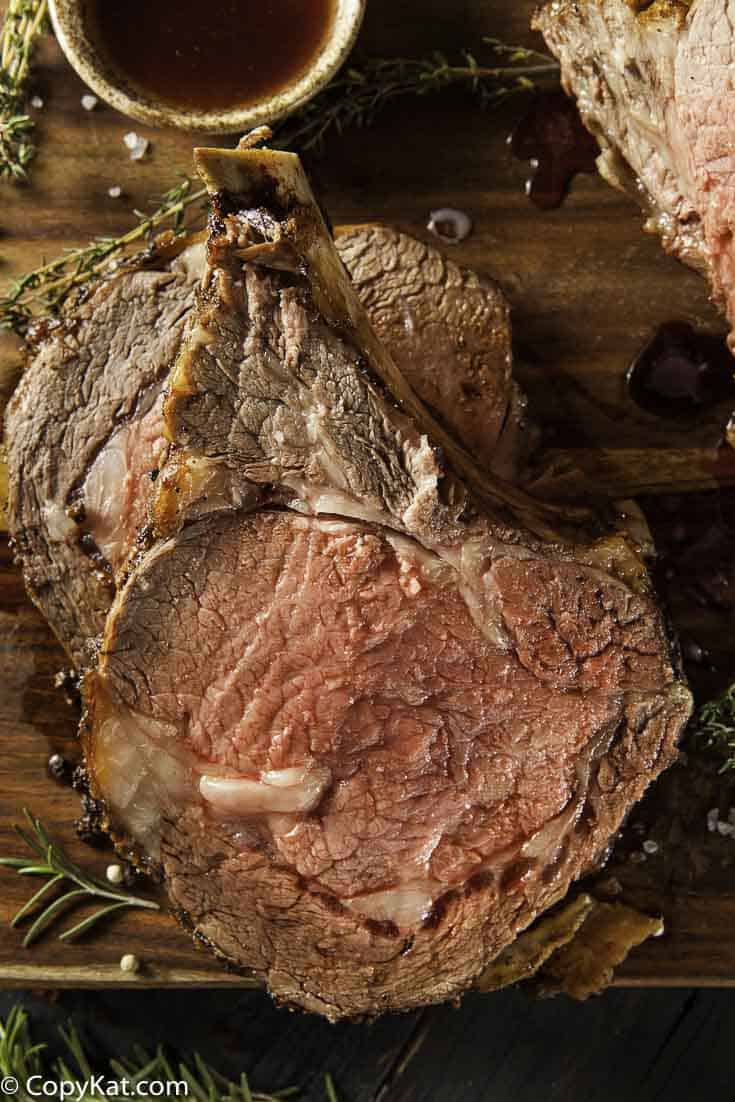
Roast Beef Recipe Ingredients
Here is a list of what you need:
- Beef roast – Choose your preferred cut based on budget and desired richness
- Kosher salt – Enhances natural beef flavors and helps create the crust
- Ground black pepper – Adds warmth and complements the beef perfectly
- Olive oil – For leaner cuts to prevent drying (optional)
Cooking the Roast
Ideally, the roast should be cooked low and slow. This has advantages over cooking the meat as quickly as possible. By cooking it at a lower temperature, the juices within the meat are retained, and your final result will be more tender and juicy.
Cooking more slowly ensures that the meat will cook more evenly. Roasts are not always uniformly shaped, and you don’t want portions of the meat to be overcooked.
How to Cook Roast Beef in the Oven
- Allow the meat to rest at room temperature for an hour before cooking it.
- Preheat your oven to 325°F.
- Sprinkle salt and pepper on the roast. For leaner roasts, first, drizzle the meat with olive oil. Optionally, truss the roast with twine, which helps it to keep its shape and cook more evenly.
- Bake the roast on a baking sheet with a wire rack for 25-30 minutes for every 1 pound of meat (this will produce a medium roast). You can use a roasting pan, but I find if you use the wire rack, all sides of the meat will form a nice crust. For example, a 4-pound roast will take approximately 120 minutes (2 hours).
- Determine what level of doneness you prefer. Check the meat’s temperature by inserting a meat thermometer into the thickest part. Aim to remove it when the meat’s internal temp is 10 degrees lower than your preferred doneness because of carry-over cooking.
- Allow the meat to rest for 15-30 minutes before enjoying it!
Roast Beef Internal Temperature
- 120-130°F for rare
- 130-135°F for medium-rare
- 135-145°F for medium
- 145-155°F for medium well
- 155°F and above is well done
Special Equipment
A meat thermometer is the only accurate way to know when the roast has reached your desired temperature range. If you estimate how it looks visually, you might under- or overcook the meat.
There are plenty of cooking thermometers available. Many thermometers have an instant digital read that tells you what the meat is internally, so there is no guessing involved.
Do you need to cover the roast?
You do not need to cover the meat in a cooking liquid; in this cooking style, you can roast it. A pot roast is a braised beef dish.
Braising means cooking with liquid, such as beef broth and stock. Both roasting and braising are great ways to cook beef, but they differ.
Wait Before You Carve the Roast
So you have cooked your roast perfectly; what should you do now? Wait for 15 to 30 minutes. Why should you wait? This will give the meat a chance to rest.
What does it mean to rest a roast? It means that the juices within the roast will get an opportunity to redistribute within the roast.
This has a few advantages. While the meat rests, you can prepare the gravy, set the table, or even make some Yorkshire pudding.
You can cut it immediately when you remove it from the oven, but if you wait a few minutes, it will pay off. So when you pull the roast out of the oven, cover it with foil and let it rest before carving it up.
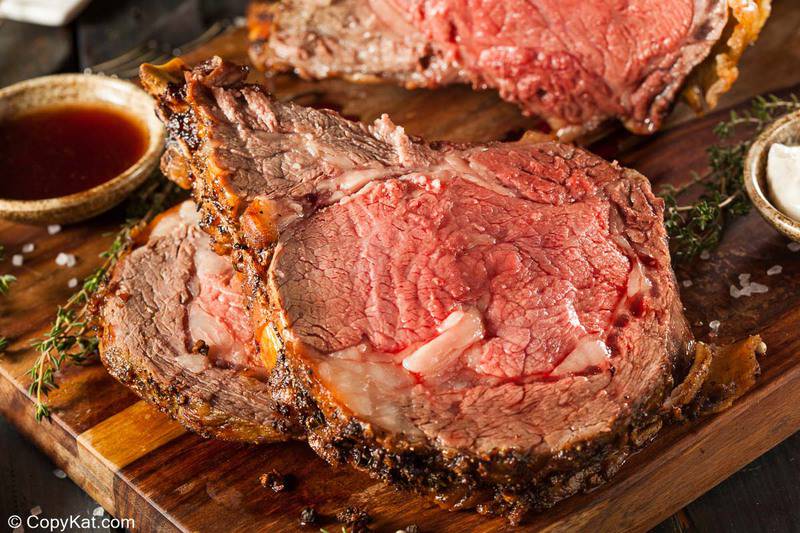
Searing the Beef
You can sear the beef if you like. Searing can help brown the roast on the outside. Some people believe this gives the roast a better flavor. I am not entirely satisfied if it enhances the taste, but it makes the beef look wonderful and brown.
To sear the beef, I suggest an iron skillet. I add some oil and a good tablespoon to the roasting pan. I like to use an oil that has a high smoke point. So something like canola or your generic vegetable oil will be perfect. Fancy olive oil tends to burn at a lower temperature, so it isn’t ideal for this use.
Season the meat, and put it into the hot skillet with the hot oil. Let the meat rest there for a couple of minutes on each side.
If you try to move the meat around initially, it will stick. It is counter-intuitive to wait. When the meat is brown, you can flip it to the other side.
Continue this process until all sides are browned. This step is not necessary for this recipe.
Other Optional Steps
Trussing
Why would you truss a roast? You can truss a roast to help force it into a smoother shape, which will contribute to cooking the roast evenly.
It can also make the roast easier to slice when it comes time to cut the beef.
Did you know that you can often ask the butcher to truss the roast for you? You can also truss the roast with butcher’s string, which is sold in most grocery stores.
How to Serve Roast Beef
Serve your oven-baked roast beef with delicious sauces to accentuate the meat’s natural flavor. For instance, pour a classic brown gravy or an umami-filled mushroom sauce over the meat. Other condiments that taste fantastic with it are horseradish, Worcestershire, or even BBQ sauce.
You can’t go wrong with a simple herb garnish. Use fresh rosemary, thyme, or parsley to instantly upgrade the presentation of the roast beef when you serve it.
How to Store Leftover Roast Beef
Leftover roast beef should be stored in an airtight container in the refrigerator for up to 5 days. Another option is to wrap it in foil or plastic wrap tightly, but there is a higher chance air will get in and deteriorate its quality, so a container is best. Allow it to cool before you transfer it to the refrigerator fully.
How to Freeze Leftover Roast Beef
Leftover roast beef can be frozen for up to three months in tightly wrapped plastic wrap or a vacuum-sealed bag.
The vacuum-sealed bag is a smart way of guaranteeing that the meat won’t get freezer burn prematurely. Make sure to safely thaw it in the refrigerator or a cold-water bath before reheating it.
What’s the Best Way to Reheat Roast Beef
I do not recommend reheating your roast beef in the microwave, as the meat can get tough. Instead, place your meat in a moderate oven with an oven temperature of 350°F.
If you have gravy, au jus, or even beef broth, I like to add a bit to the pan, roast the beef, wrap it with foil, and reheat for about 20 minutes.
This ensures the meat comes out tender and juicy, just like the first time.
What to Serve with Roast Beef
Here are some delicious side dishes to make and serve with roast beef:
- Boiled Carrots
- Fried Okra
- Green Bean Bundles
- Jiffy Corn Casserole
- Oven Roasted Brussels Sprouts
- Roasted Red Potatoes
- Scalloped Potatoes
Popular Roast Recipes
- Beef Tenderloin Roast
- Eye of Round Roast
- New York Strip Roast
- Oven Brisket
- Ribeye Roast
- Tri Tip Roast
Look at even easier beef recipes and the best side dish recipes here on CopyKat!
Perfect Sunday Roast Beef: Foolproof Low & Slow Method
Ingredients
- 3 to 4 pound roast like a ribeye roast
- 1 tablespoon kosher salt
- 1 to 2 teaspoons black pepper, crushed or ground
Instructions
- To prepare the meat remove from the refrigerator 60 minutes before cooking. This will give the roast a chance to reach room temperature.
- Preheat oven to 325 degrees.
- If the roast is very lean you may want to drizzle a tablespoon of olive oil or two over the roast. Sprinkle salt and pepper over the roast. Place the roast on a wire rack on a baking sheet. Bake the roast for approximately 25 to 30 minutes for every pound of meat for a roast to be cooked to medium.
- Adjust accordingly for your preferred level of doneness. You should use a meat thermometer to determine when the roast is done. Push the meat thermometer all of the way into the center of the roast. Pull the roast from the oven when the inside temperature of the roast is about 10 degrees less than your desired level of doneness. The temperature of the roast may rise while the roast is resting.
- Let the roast rest for at least 15 minutes, tented in aluminum foil to keep warm, before carving to serve. Rare : 120 – 130 degrees – bright purple red, tender and juicy. Medium Rare: 130-135 degrees – bright red, warm, tender very juicy.Medium: 135 -145 degrees – rich pink, slightly juicy Medium well: 145 – 155 degrees – tan with slight pink, firm, slight juice Well Done: 155 and above – tan to brown, very little juice, meat can become tough.
- So if you want a medium rare roast remove it from the oven when the internal temperature reaches 120, it will rest for 15 minutes. The internal temperature will rise while the meat is resting. It is always best to use a meat thermometer if you have one to ensure you cook the roast to your desired level of doneness.PLEASE NOTE: Your cooking time depends on the size of your roast.
Video
Notes
- 🔪 PREP TIP : Room temperature meat roasts more evenly
- 🌡️ TEMP TIP : Remove roast 10°F below target temperature
- ⏰ TIMING TIP : Calculate 25-30 minutes per pound


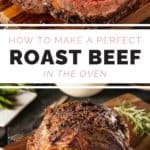
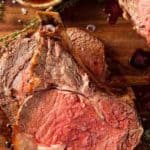
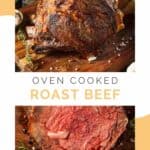
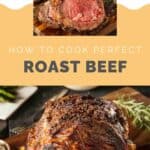
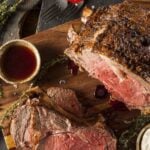
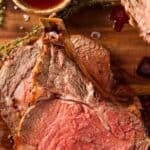
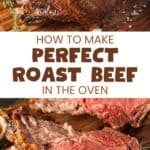
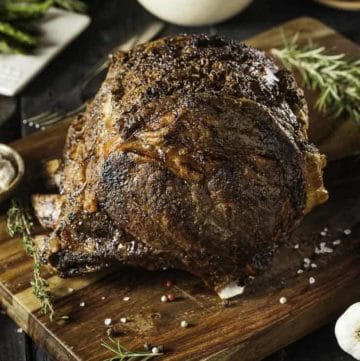
i used top round and followed recipe exact. came out dry and tough. removed when temp was 120. not sure why it failed.
I am so sorry you had a bad result. My only guess on why this may have failed was if you pulled the meat at 120 degrees, it was yet done, rare starts at 125 degrees. Also, you need to let it rest before slicing. I don’t know if you waited or not. Resting time is important to redistribute the juices in the meat.
used an eye of round and it came out tender and flavorful.
Excellent
Stuffing with great garlic slivers garlic is worth the extra effort.
I cook my Leg of Lamb the same way!!!
Gas ovens are the best!
Unfortunately, I have electric now and it stinks!
Oh well, enjoy💕🐶💕
yummy and easy!!!
In Canada for those here reading the recipes we grade beef differently. The top quality is that of AAA. Next is AA then Choice. There is also a 4th level and labeled cut from unknown grade.
I didn’t know that. I appreciate you sharing this.
With the new style of ovens and cooktops an additional bit of information could include the methods for Induction cooktops and Convection ovens. We find that the new ranges cook much quicker and appear to be hotter when set to conventional temperatures. Not very many directions include Convection instructions. Is there a possibility that these differences could be published.
I would need to do more research on this, and see what I can find. I don’t know if all convection ovens are equal in how they circulate and produce heat. Does your oven manufacture have a guide for you? My old convection oven had a button on it that it would “normalize” the cooking times on it, but it also came with a meat probe.
So, no Instant Pot version?
No, an Instant Pot version would be for a roast that is cooked in liquid, this was intended to be a roasted meat, not a braised (cooked in liquid) type of roast.
If I cook this roast so that it is more on the rare side (I.e. juicy & tender!) Will it be safe to use the leftovers in a soup later? Or should it be cooked more “well done” for longevity purposes 🤔
It does not matter, if you are going to put the meat into the soup, the meat will cook when you put it into the soup.
I read on other sites to cook it low and slow…
So you should cook pot roasts low and slow, they are ideal for tougher cuts of meat. We are roasting meat here, ideally these would be with cuts that are more tender.
I always preheat the oven to 450°. As soon as the roast goes in the over temp is turned down to 325°. Timing is the same as yours but that initial high heat gives a beautiful sear to the meat and keeps all the juices in.
I actually sear in a little hot oil in my cast iron Dutch oven after shing in a bag of seasoned flour. Add potato quarters and carrots, cover and low and slow bake
How can I use fresh rosemary to season the roast? Is it just a garnish that isn’t eaten? I have a rosemary shrub.
You could use it as a garnish, or chop a bit of it and add it to the salt on top, I wouldn’t add more than a couple of teaspoons through, it may over power the roast.
Not seared first, would that be a good step to add?
It is unnecessary to add this step, as we are roasting the beef. We often do this when we braise beef (cooking beef in a liquid like a pot roast.)
I made this last night with great success. I had a chuck roast and it needed to be cooked but was not in the mood for pot roast. When I do a roast like this (dry heat) I brush it liberally with Kitchen Bouquet or Gravy Magic and then season it with Morton’s Nature Seasoning and fresh ground pepper. The roast was just shy of 3 lbs. I cooked it for one hour at 350. It was the perfect doneness for me. I cooked it standing up on a rack so the heat got to it all around. Took it out of the oven and let it sit for 30 minutes. Then I thin sliced it on an electric meat slicer. I served it with mashed potatoes and some gravy I made with leftover juice from another pot roast cooked earlier in the week. Even my picky eater liked it! Thanks for offering this recipe.
The last time I tried to do Roast beef, it was unsuccessful. Now, I give it a try by using your recipe and it was just perfect.
This was the best recipe for roast I’ve ever tried thank you
I was skeptical of not cooking this in a broth, but it was good. I will make this again.
It nice to hear your family fun at dinner time on weekends and cooler months BUT! It sure took you a very long time to get to the Recipe!!
But thank You So Much For It.
I’ll use it again…
I used a rump roast, package of steamer gold potatoes and baby carrots. The meat was very tender and veggies soft, but held their shape.
I was impressed when the first recipe I looked had a step so I could send that recipe to my email. I was VERY disappointed to find no other recipes with that
clever option.
Ellana